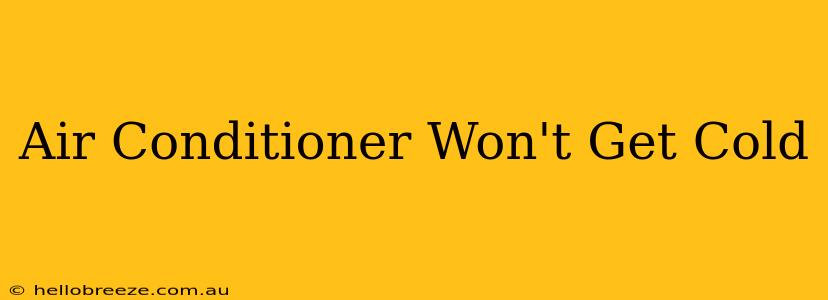Is your air conditioner refusing to blow cold air? A hot, uncomfortable home is never fun, especially during those sweltering summer months. This guide will walk you through troubleshooting common issues that cause your AC unit to malfunction, helping you pinpoint the problem and potentially save on costly repair bills. We'll cover everything from simple fixes you can try yourself to when it's time to call in a professional.
Common Reasons Your AC Isn't Cooling
There are several reasons why your air conditioner might be struggling to cool your home effectively. Let's explore some of the most frequent culprits:
1. Dirty Air Filter: The Most Common Culprit
A clogged air filter is the most common reason for an AC unit to underperform. A dirty filter restricts airflow, causing the system to strain and potentially overheat. This leads to reduced cooling capacity and can even damage your compressor.
- Solution: Check your air filter. If it's dirty or dusty, replace it immediately with a new, clean filter. This is often the easiest and cheapest fix!
2. Frozen Evaporator Coil: A Chilling Problem
A frozen evaporator coil indicates a problem with airflow or refrigerant. Insufficient airflow, often due to a dirty filter or blocked vents, can cause the coil to freeze.
- Solution: Turn off your AC unit and allow the ice to melt completely. Once melted, check and clean the air filter and ensure vents are clear. If the problem persists, a refrigerant leak or other internal issue may require professional attention.
3. Refrigerant Leaks: A Serious Issue
Refrigerant is essential for your AC unit's cooling process. A refrigerant leak reduces cooling capacity significantly. You might notice a hissing sound or see a noticeable drop in cooling performance.
- Solution: Refrigerant leaks require professional attention. Do not attempt to repair this yourself. A qualified HVAC technician can identify the leak and properly recharge your system.
4. Electrical Issues: Power Problems
Problems with your electrical system, such as a tripped breaker or faulty wiring, can prevent your AC unit from functioning correctly.
- Solution: Check your breaker box for any tripped breakers. Reset the breaker if necessary. If the problem persists, consult a qualified electrician.
5. Faulty Compressor: The Heart of the Problem
The compressor is the heart of your AC unit. A failing compressor will severely impact cooling performance. This is a costly repair, often indicating the need for AC replacement.
- Solution: A malfunctioning compressor requires professional diagnosis and repair. Listen for unusual noises like grinding or rattling.
6. Clogged Condenser Coils: Restricted Airflow
Similar to the evaporator coil, clogged condenser coils restrict airflow and reduce efficiency. These coils are located outside your home.
- Solution: Carefully clean the condenser coils using a coil cleaning brush or compressed air. Be cautious when working with electrical components. If you're uncomfortable doing this, call an HVAC professional.
When to Call a Professional
While some minor issues can be tackled at home, certain problems require the expertise of an HVAC technician. Call a professional if:
- You suspect a refrigerant leak.
- The compressor is malfunctioning.
- You've tried basic troubleshooting steps, and the problem persists.
- You're uncomfortable working with electrical components.
Ignoring AC problems can lead to further damage and costly repairs in the long run. Regular maintenance, including filter changes and professional inspections, can help prevent major issues and keep your AC unit running efficiently for years to come. Stay cool and comfortable!

